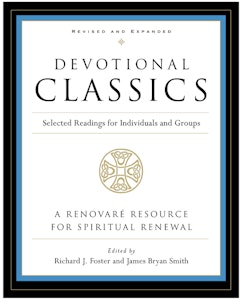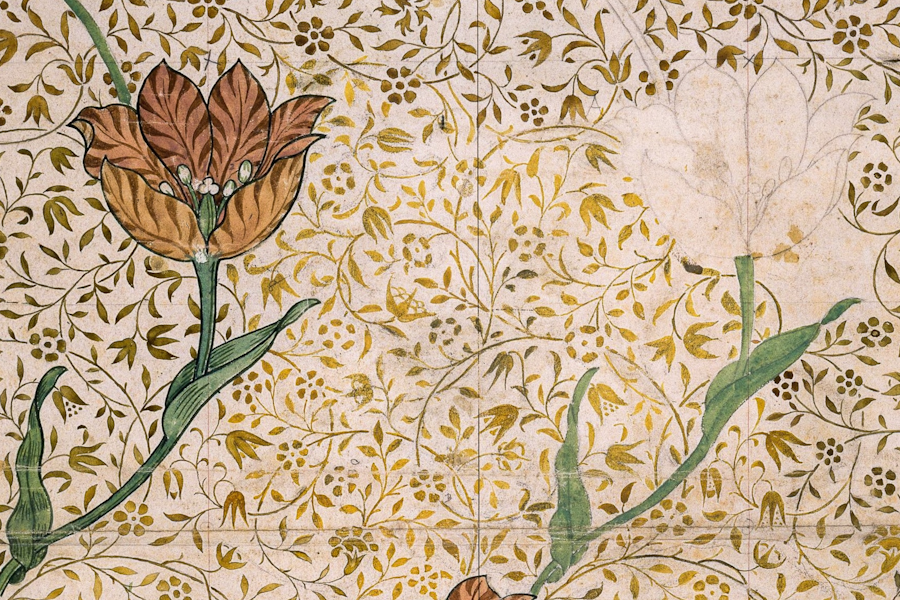Introductory Note:
Julian (1343-1413) is the most popular of the English mystics. She lived as a Benedictine nun in Norwich, beside the St. Julian Church, from which she most likely took her name. Little is known about Julian’s life, although she is mentioned by her contemporary, Margery Kempe.
Julian’s book Revelations of Divine Love entitled her to become the first great female writer in the English language. Despite her disclaimers of being unskilled as an author, she wrote lively prose in a style all her own. She was well trained in the Bible as well as the teachings of the Church.
Her theology is based on her mystical experiences. She became seriously ill at the age of thirty and in the midst of her suffering prayed for a vision of Christ’s passion. Once in a time of prayer Julian heard the words, “I am the foundation of your praying”—words that greatly influenced her spiritual life. She always pointed to the goodness and love of God, a light in a time of darkness for Julian, who lived in an age of social unrest and fear of the Black Plague.
Joy is perhaps the keynote in her writings. She penned the famous saying, “All shall be well and all shall be well, and all manner of things shall be well.” Her writings have been called “the most perfect fruit of later medieval mysticism in England.” The following selection shows both her intense desire and her sane reasoning. While her “revelations” may be hard for us today to identify with completely, they contain significant insights from which we all can learn.
Notice that the end result of Julian’s experiences is to be drawn into a deep understanding of the goodness of God. She, in fact, calls the experience of the goodness of God “the highest form of prayer.”
This is a hard reality for us moderns to enter into. We have been taught that “the good life” resides in everything and anything but God. Discipleship, the cross, obedience—these are hardly words that we associate with goodness. And because we cannot see the goodness of rightness, we fail to see the goodness of God. But perhaps, just perhaps, we can take a cue from Julian—and the psalmist—to “taste and see that the Lord is good.”
Renovaré Team
 Excerpt from Devotional Classics
Excerpt from Devotional Classics
1. Still I Desired More
In the year 1373, on May 13, God gave me a three-fold revelation. This was his gracious gift to me in response to my desire to know him more.
The first was a deep recollection of his passion. The second was a bodily sickness. The third was to have, of God’s gift, three wounds.
As to the first, it seemed to me that I had some feeling for the Passion of Christ, but still I desired to have more by the grace of God. My wish was to have been present with those who loved Christ and were with him at his passion so that I, with my own eyes, might have seen the passion which our Lord suffered for me, and so that I might have suffered with him as the others did who loved him. I never desired any other sight or revelation of God.
2. Purged by God’s Mercy
As to the second grace, there came into my mind a desire of my will to have by God’s gift a bodily sickness. I wished that the illness might be so severe that it seemed mortal. This was so that I might receive all the rites of the Church and to think that indeed I was about to die.
I wanted to experience every kind of pain, bodily and spiritual, which I would have if I were to die — every fear and temptation. I intended this because I wanted to be purged by God’s mercy and afterwards live more to his glory because of that sickness.
These two desires about the Passion and the sickness which I desired from him were with a condition because it seemed to me that this was no ordinary kind of prayer. Therefore I prayed, “Lord, you know what I want. If it is your will that I have it, or if it is not your will, do not be displeased with my prayer, for I do not want anything that you do not want.”
3. Three Wounds
As to the third, by the grace of God and the teaching of the Church I conceived a great desire to receive three wounds in my life. They were: the wound of true contrition; the wound of loving compassion; and the wound of longing with my will for God.
Though I asked for the other two conditionally, I asked urgently for this third without any condition. The two desires which I mentioned first passed from my mind, but the third remained there continually.
4. To Live to Love God Better
When I was thirty years old, God sent me a bodily sickness in which I was confined to the bed for three days and nights. On the third night I received all the rites of the Church, and I did not expect to live until morning.
After this I remained in bed for two more days, and on the sixth night I thought that I was on the point of death as did those who were with me. And yet, I felt a great reluctance to die, not because of any thing on earth which held me here or because of any fear or pain, for I trusted the mercy of God. But it was because I wanted to live to love God better and longer so that I might through the grace of that living have more knowledge and love of God than I might have even in heaven!
I realized that all the time that I had lived here was very little and short in comparison with the bliss of eternal life in heaven. I thought, “Good Lord, can my living no longer be to your glory?” With all the will of my heart I assented to be wholly God’s.
5. The Image of Your Savior
I lasted until the seventh day, and by then my body felt dead from the inside. My curate was sent for to be present at my death. Before he came into the room, my eyes were fixed upwards, and I could not speak. He set the Cross before my face and said, “I have set the image of your Savior before you; look at it and take comfort from it.”
It seemed to me that I was well, though my eyes were still fixed upwards, as it seemed to me that it was upwards to heaven that I was going. Nevertheless, I agreed to fix my eyes on the face of the Crucifix if I could. I did, but soon after my sight began to fail, and the room grew dark around me. As my eyes focused on the Cross, everything around it appeared ugly as if all around it were terrifying demons.
After this the upper part of my body began to die. I could not feel anything. My greatest pain was the shortness of breath. I truly believed that I was on the point of my death when suddenly, at that moment, all the pain was taken away and I was well, as well as I had ever felt before. I felt uneasy, though, wishing that I would have been delivered from this world to be with God, as my heart had longed for.
6. Hot and Flowing Freely
Then suddenly it came into my mind that I ought to wish for that first grace, that my body might be filled with a recollection of Christ’s passion. It seemed to me that I might also receive the wounds which I had been praying for as well. Yet I never asked for any kind of revelation or vision from God — I only wanted to have the compassion I thought a loving soul would have for Jesus by witnessing his suffering.
It was at that moment that I saw red blood running down from under the crown, hot and flowing freely, just as it must have been beneath the crown of thorns that pressed upon his head. I fully perceived at that moment that it was Jesus, both God and man, who suffered for me, for I now knew it directly without anyone telling me.
In that same revelation, suddenly the Trinity filled my heart full of the greatest joy, and I understood that it will feel like that in heaven. For the Trinity is God; God is the Trinity. The Trinity is our maker, the Trinity is our protector, the Trinity is our everlasting lover, the Trinity is our endless joy and bliss, by our Lord Jesus Christ and in our Lord Jesus Christ.
Where Jesus appears, the blessed Trinity is understood. I said, “Blessed be the Lord!” in a loud voice. I was astonished that our God who is to be feared and revered would be so intimate with a sinful creature such as I.
7. No Bigger Than a Hazelnut
At the same time as I saw this sight of the head bleeding, our good Lord showed a spiritual sight of his familiar love. I saw that he is to us everything which is good and comforting for our help. He is our clothing who wraps and enfolds us for love, embraces us and shelters us, surrounds us for his love which is so tender that he may never desert us. And so in this sight I saw that he is everything which is good, as I understand.
And in this he showed me something small, no bigger than a hazelnut, lying in the palm of my hand, as it seemed to me, and it was as round as a ball. I looked at it with the eye of my understanding and thought: What can this be? I was amazed that it could last, for I thought that because of its littleness, it would suddenly have fallen into nothing. And I was answered in my understanding: It lasts and always will, because God loves it; and thus everything has being through the love of God.
In this little thing I saw three properties. The first is that God made it, the second is that God loves it, the third is that God preserves it. But what did I see in it? It is that God is the Creator and the protector and the lover. For until I am substantially united to him, I can never have perfect rest or true happiness, until, that is, I am so attached to him that there can be no created thing between my God and me.
And also our good Lord revealed that it is very greatly pleasing to him that a simple soul should come naked, openly and familiarly. And lovingly I pray to thee O’ God, by your goodness give me yourself, for you are enough for me.
And these words of the goodness of God are very dear to the soul and very close to touching our Lord’s will, for his goodness fills all his creatures and all his blessed works full and endlessly overflows in them. For he is everlastingness, and he made us only for himself and restored us by his precious Passion and always preserves us in his blessed love; and all this is of his goodness.
8. The Highest Form of Prayer
This revelation was given to my understanding to teach our souls wisely to adhere to the goodness of God. At the same time, our habits of prayer were brought to my mind, and how, in our ignorance of love, we are accustomed to use intermediaries in our prayers. It was then I saw that it brings more honor to God and more true delight if we faithfully pray to him for his goodness than if we employ all the intermediaries in the world. Why? Because his goodness is full and complete, and in it there is nothing lacking.
We pray to God to know his passion, death, and resurrection — which come from the goodness of God. We pray to God for the strength that comes from his Cross — which also comes from the goodness of God. We pray to God with all the help of the saints who have gone before us — which, again, comes from the goodness of God. All of the strength that may come through prayer comes from the goodness of God, for he is the goodness of everything.
For the highest form of prayer is to the goodness of God. It comes down to us to meet our humblest needs. It gives life to our souls and makes them live and grow in grace and virtue. It is near in nature and swift in grace, for it is the same grace which our souls seek and always will.
9. Immeasurable Love
Just as our flesh is covered by clothing, and our blood is covered by our flesh, so are we, soul and body, covered and enclosed by the goodness of God. Yet, the clothing and the flesh will pass away, but the goodness of God will always remain and will remain closer to us than our own flesh.
God only desires that our soul cling to him with all of its strength, in particular, that it clings to his goodness. For of all of the things our minds can think about God, it is thinking upon his goodness that pleases him most and brings the most profit to our soul.
For we are so preciously loved by God that we cannot even comprehend it. No created being can ever know how much and how sweetly and tenderly God loves them. It is only with the help of his grace that we are able to persevere in spiritual contemplation with endless wonder at his high, surpassing, immeasurable love which our Lord in his goodness has for us.
Therefore we may ask from our Lover to have all of him that we desire. For it is our nature to long for him, and it is his nature to long for us. In this life we can never stop loving him.
I learned a great lesson of love in this blessed vision. For of all things, contemplating and loving the Creator made my soul seem less in its own sight and filled it full with reverent fear and true meekness and with much love for my fellow Christians.
Excerpts taken from Devotional Classics: Selected Readings for Individuals and Groups (Richard J. Foster & James Bryan Smith, Editors. HarperCollins, 1993.)
Originally from Showings. (Translated by Edmund Colledge and James Walsh. New York: Paulist, 1978.)
Artwork: Wallpaper design “Garden Tulip,” 1885 by William Morris, shared with permission of Birmingham Museums Trust on Unsplash.
Text First Published December 1992 · Last Featured on Renovare.org June 2022


